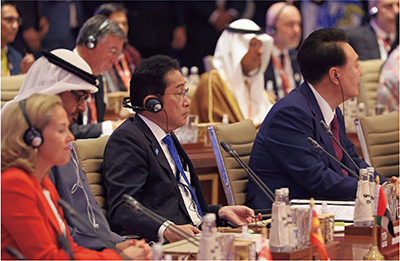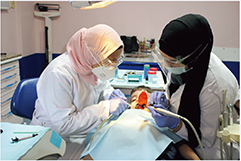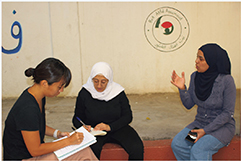(2) Partnership with Other Countries and International Organizations
A. Partnership in the G7 and G20

Prime Minister Kishida attending Session 1 and the working lunch of the G20 New Delhi Summit (Photo: Cabinet Public Relations Office)
In 2023, as the holder of the G7 Presidency, Japan led discussions on how to address critical issues facing the international community, including development (see Part I, Section 2 for details). In addition, as part of the G7’s development-related efforts, it held the G7 Senior Development Officials (SDOs) Meeting in Tokyo in February, and reaffirmed the importance of solidarity with developing countries by issuing the Chair’s Summary of the discussions in March. Furthermore, in preparation for the Hiroshima Summit, Japan expressed its intention to accelerate progress on priority issues in development cooperation, including development finance, the Partnership for Global Infrastructure and Investment (PGII), food security, nutrition, humanitarian assistance, climate change, health, disaster risk reduction, and education.
As for the G20, the G20 Development Ministerial Meeting took place in Varanasi, India, in June 2023. From Japan, then State Minister for Foreign Affairs Takei attended the meeting and called on the G20 members to reaffirm their strong commitment to achieving the SDGs amid the widening financing gap. He also held a separate talk with the attendees of each G20 member and reassured collaboration with them in the field of development.
As for the G20 New Delhi Summit in September, Prime Minister Kishida attended from Japan. With the intention of linking the outcomes of the G7 Hiroshima Summit to the G20, Prime Minister Kishida actively laid out Japan’s positions and efforts on critical issues facing the international community. The G20 New Delhi Leaders’ Declaration, which was issued at the end of the Summit, featured the outcomes of the G7 in areas such as food security, environment, and health.
In Session 1 “One Earth,” Prime Minister Kishida pointed out that Russia’s aggression against Ukraine is exacerbating the difficulties facing the global economy, including on food and energy, and that the G20 needs to address them. Regarding food issues, Prime Minister Kishida noted that a concrete action plan was formulated at the G7 Hiroshima Summit with the participation of invited countries, which confirmed the value of such initiatives as the “Agricultural Market Information System (AMIS),” launched by the G20 to enhance data gathering, and the “Millet and Other Ancient Grains International Research Initiative (MAHARISHI),” promoted by India. He also expressed his willingness to work on building sustainable and resilient agriculture and food systems. On climate and energy, Prime Minister Kishida stated that it is imperative to transform into a decarbonized economy through inclusive investments without compromising economic growth and energy security. Highlighting the need to aim to achieve the common goal of net zero through various pathways in accordance with national circumstances, he also underscored Japan’s intention to utilize all technologies and energy sources to promote innovation and support efforts in each country.
In Session 3 “One Future,” Prime Minister Kishida noted that in order to overcome the challenges facing the international community and realize a better future, it is necessary to reform multilateral systems. He pointed out that as the future of the world depends on the future of developing countries, it is essential to support their sustainable growth, and stated that Japan would work on the evolution of Multilateral Development Banks (MDBs) in order to meet the development needs of developing countries. He went on to state that it is necessary for more creditor and debtor countries to share the importance of transparent and fair development finance in compliance with international rules and standards, and that such efforts should also be promoted at the G20. Prime Minister Kishida emphasized that in order to respond to the debt problem of developing countries, which is becoming serious, it is essential to promptly carry out debt restructuring under the “Common Framework for Debt Treatments beyond the Debt Service Suspension Initiative (DSSI)” and through official creditor committees for Sri Lanka and other debtor countries. Furthermore, Prime Minister Kishida stated that when investing in infrastructure, the “G20 Principles for Quality Infrastructure Investment” should be respected. He also highlighted that Japan has pledged in its new plan for a “Free and Open Indo-Pacific (FOIP)” announced in March 2023 more than 75 billion US dollars in public and private funds for the infrastructure in the Indo-Pacific region by 2030, and that Japan intends to grow together with each country. Regarding health, Prime Minister Kishida stated that his priorities are achieving universal health coverage (UHC) and strengthening prevention, preparedness and response (PPR) for a possible next health crisis, including the provision of prompt and efficient funding in times of crisis. In particular, he stated that the G20 has confirmed the importance of strengthening the delivery of medical countermeasures (MCMs), which was advocated at the G7 Hiroshima Summit, and that Japan looks forwards to working with G20 members, the World Health Organization (WHO), the World Bank, and other partners.
B. Dialogue with Major Donors
Japan holds dialogues with major donors to exchange views on priority issues and policies. Then State Minister for Foreign Affairs Takei exchanged views online with Mr. Mitchell, Minister of State, Foreign, Commonwealth and Development Office of the United Kingdom in January 2023 and with Mr. Sajjan, then Minister of International Development of Canada in February 2023, and concurred respectively to cooperate toward the G7 Summit. In addition, the Japan-UK Development Policy Dialogue (at the Director-General level) was held in London in February.
In October 2023, based on the Japan-U.S.-ROK Summit in August 2023, the Japan-U.S.-ROK Trilateral Development and Humanitarian Assistance Policy Dialogue (at the Director-General level) took place. The three countries reaffirmed their commitments to a “Free and Open Indo-Pacific (FOIP)” through the promotion of trilateral development cooperation. Japan also held the Japan-U.S. Development Policy Dialogue and Japan-ROK Development Policy Dialogue (both at the Director-General level) on this occasion.
The members of the Development Assistance Committee (DAC) of the Organisation for Economic Co-operation and Development (OECD) are traditionally engaged in development cooperation. However, emerging countries such as China, India, Indonesia, Saudi Arabia, Türkiye, Brazil, and South Africa, have become active in providing assistance to developing countries in recent years. Through such assistance, these emerging countries have come to gain considerable influence over development issues. In cooperation with other countries, including emerging countries, Japan supports emerging countries in providing developing countries with assistance in an effective manner.
With regard to Japan-China relations, the Second Japan-China International Development Cooperation Policy Consultation was held in June 2021. Both countries exchanged views on various development issues and foreign aid from China.
The “Global Partnership for Effective Development Cooperation (GPEDC)” is a multi-stakeholder platform for driving the effectiveness and efficiency of development cooperation, bringing together not only donor countries but also a wide range of stakeholders, including developing countries, international organizations, private sectors, civil society, and local public entities for discussions. In conjunction with the partnership, the Busan Global Partnership Forum took place in December 2023, and reaffirmed the importance of GPEDC’s four principles: country ownership, focus on results, inclusive partnerships, and transparency and mutual accountability.
C. Partnership with International Organizations
To address various developmental and humanitarian issues as well as global challenges, Japan promotes collaboration with international organizations.
Then State Minister for Foreign Affairs Takei received a courtesy call from Mr. Sands, Executive Director of the Global Fund in March 2023, and from Dr. Avafia, Deputy Executive Director of Unitaid, and Mr. Gore, Executive Director of Medicines Patent Pool (MPP) in June. Foreign Minister Kamikawa held meetings with Mr. Lazzarini, Commissioner General of the United Nations Relief and Works Agency for Palestine Refugees in the Near East (UNRWA), and Mr. Grandi, the United Nations High Commissioner for Refugees, who both visited Japan in October.
In addition, in order to facilitate assistance through partnerships with international organizations, Japan also holds dialogues with major international organizations, including UN agencies. In 2023, Japan engaged in regular policy dialogues with the United Nations International Children’s Emergency Fund (UNICEF), the United Nations Development Programme (UNDP), the United Nations High Commissioner for Refugees (UNHCR), and others (see “Stories from the Field 6” for Japanese personnel who work at the Food and Agriculture Organization of the United Nations (FAO), and “Japanese Personnel at International Organizations Playing Active Roles on the Front Lines across the World” for Japanese personnel who work at international organizations).
D. Partnership with Multilateral Development Banks (MDBs)
Multilateral Development Banks (MDBs)Note 5 is a generic term for international organizations that support poverty reduction and sustainable economic and social development in developing countries. As poverty worsens and inequality widens due to cross-border challenges such as the pandemic and climate change, the World Bank and other MDBs promote initiatives, including MDBs evolution, toward strengthening the response to global issues and the use of existing capital to respond to increasing development financing needs (CAF Review).Glossary
The importance of MDBs evolution for enhancing their functions was also discussed at the G7 Hiroshima Summit in May and the G20 New Delhi Summit in September, where the leaders of each country endorsed the MDB evolution agenda. Japan has led the discussions as a holder of the G7 Presidency, and it is expected that the support of the G7 will help increase the lending capacity of the World Bank by more than 35 billion US dollars.
Featured Project 13
Lebanon
Delivering Medical Assistance to Refugee Children
Medical, Health, and Psychosocial Support in Palestinian Refugee Camps in Lebanon
Japan Platform (JPF) (September 2022 – June 2023)
Due to the political and social turmoil in the Middle East since 2011, there are many displaced persons staying in Lebanon. This includes double refugees, such as Palestinian refugees who were forced to leave their first host country, Syria, due to its crisis. The majority of displaced persons in Lebanon are forced to live in poor conditions. Meanwhile, the host communities also bear heavy social and economic burdens. In particular, children, women, and persons with disabilities need more support as they are put in particularly vulnerable positions.
In response to this situation, the Campaign for the Children of Palestine (CCP Japan), one of the member organizations of the Japan Platform (JPF),Note 1 focuses on the fact that there is a significant lack of medical care, especially dental and psychiatric support for children, in the Palestinian refugee camps in Lebanon. With the support of the Government of Japan, CCP Japan provided dental care, hygiene education, child psychiatry treatment, and psychosocial support to approximately 6,000 people in seven refugee camps. In addition, CCP Japan conducted human resources development for social workers and those involved in volunteering activities.
Japan will continue to stand by and provide attentive support to vulnerable persons through JPF and its member NGOs.

A child in a refugee camp receiving dental treatment (Photo: CCP Japan)

A Japanese staff conducting an interview with one of the guardians of the children receiving medical support (Photo: CCP Japan)
Note 1: See the glossary.
Glossary
- Capital Adequacy Framework (CAF) Review
- An independent review of the CAF of MDBs, a G20 initiative, which explores measures to maximize the use of MDBs’ existing capital. A roadmap featuring the progress and other information of the CAF review was formulated at the G20 Finance Ministers and Central Bank Governors Meeting in July 2023, and reported at the G20 New Delhi Summit in September.
- Note 5: See the glossary.
